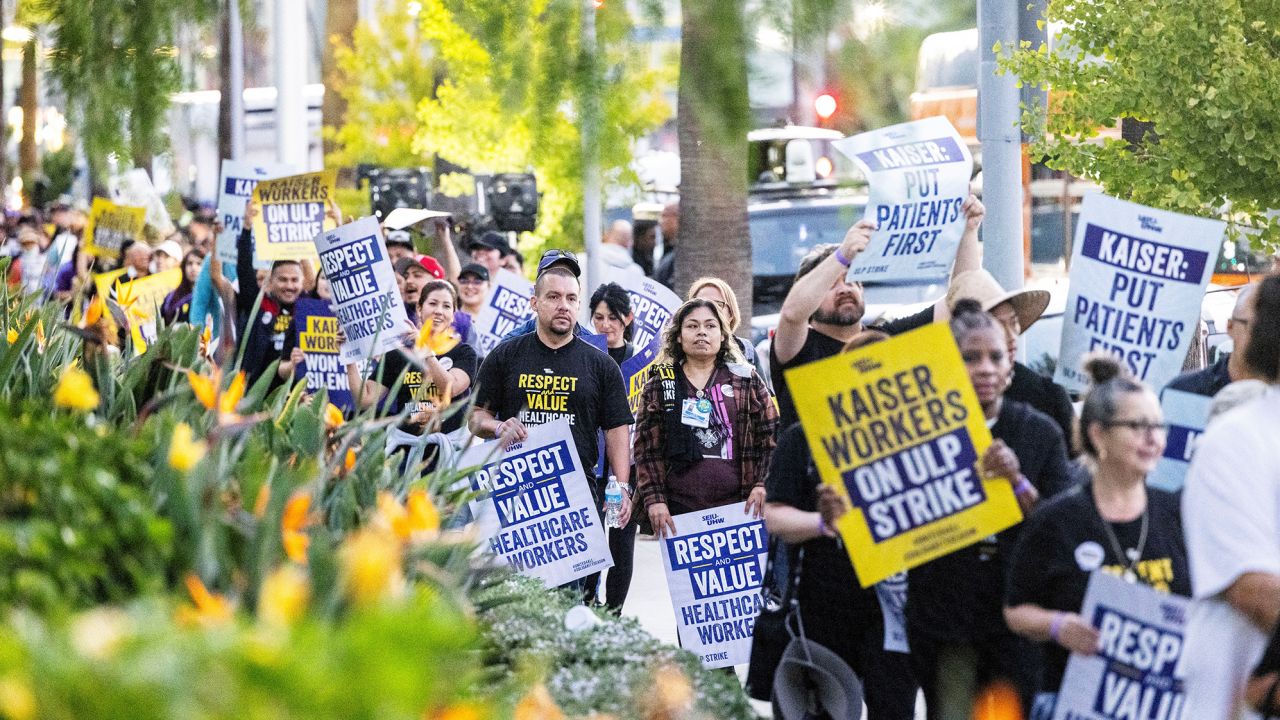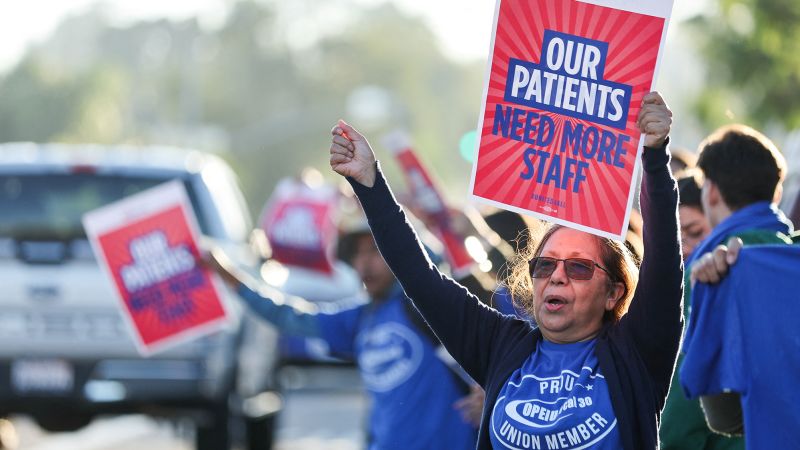CNN
—
On Wednesday, more than 75,000 unionized employees of Kaiser Permanente, one of the nation’s largest not-for-profit health providers, walked off the job, marking the largest health care worker strike in US history.
The striking employees, who work across California, Colorado, Washington, Virginia, Oregon and Washington, DC, are represented by a coalition of eight unions that comprise 40% of Kaiser Permanente’s total staff. The vast majority of the striking workers are in West Coast states. The strike began at 6 am local time, and will run through Saturday morning.
The unprecedented strike comes at a time of heightened labor activity across the United States, with tens of thousands of workers across multiple industries taking to the picket lines for better pay and benefits. In the wake of pandemic, however, health care workers in particular have been fighting for safer and more secure work environments. They are demanding improved staffing levels, arguing that current staff shortages are compromising patient care and taking many workers to a breaking point.
Employees on the picket lines include nursing staff, dietary workers, receptionists, optometrists, and pharmacists. The strike effort comes after the workers’ union contracts expired at 11:59 pm PT on September 30. Negotiations between the union and Kaiser Permanente continued into Wednesday, according to James Santos, field coordinator for the coalition of Kaiser unions in Virginia, but he said no deal to avert the strike had yet been reached.
Picket lines in Virginia and Washington DC facilities, most of which are not open 24 hours, went at 7 am ET.
In a statement from Kaiser at 9 pm PT Tuesday, it said “Our team is available 24/7 to continue bargaining with the coalition until we reach a fair and equitable agreement. We remain optimistic that there is still time to find agreement before any of the work stoppages called by the coalition unions begin at 6 am on Wednesday.”
But as 6 am arrived on the West Coast, there was no word of a deal, and employees headed for the picket lines.
The strike is temporary. Kaiser Permanente workers will return to work on October 7 at 6 am local time in each state that joins the strike. However, a “longer, stronger” strike may come in November if a deal between the coalition and Kaiser Permanente is not reached after this strike effort, according to communications from SEIU-UHW, the largest union in the coalition.
Striking employees say staff shortages have left them feeling overworked and burnt out. In a recent statement, Kaiser Permanente said it has agreed to accelerate hiring, setting a goal of hiring 10,000 new people for union-represented jobs by the end of 2023.
The union coalition is demanding higher pay, a strategy by Kaiser Permanente management to tackle chronic staff shortages, protections against outsourcing, and earlier notice when management calls remote workers back to in-person work.
According to an update by SEIU-UHW, negotiating progress was made before the strike began, though management and the unions are still far apart regarding employee raises.
Kaiser Permanente has offered location-dependent wage increases, with a maximum of 4% for each of the four years of the new contract, according to an October 1 update by SEIU-UHW. The coalition rejected that offer, saying such a raise proposal fails to keep up with the cost of living.
The coalition is asking for an across-the-board 6.5% raise in the first two years of the labor contract and a 5.75% raise in the next two years.
“Workers are really being squeezed right now,” Renee Saldana, a spokesperson for SEIU-UHW, told CNN. “They went through the worst global health crisis in a generation and then they come out and they’re worried about paying rent, they’re worried about losing their house, they’re worried about living in their cars.”
In a statement, Kaiser Permanente said it is a leader in pay.
“We lead total compensation in every market where we operate, and our proposals in bargaining would ensure we keep that position,” a spokesperson for Kaiser Permanente said in a statement.
Kaiser Permanente management and union representatives agreed on some of the union’s demands. For example, Kaiser Permanente agreed to renew outsourcing and subcontracting protections for many workers and decided on 60-day notice before remote staff are required to return to in-person work, according to SEIU-UHW.

Kaiser Permanente operates differently from the fee-for-service model of most health care providers in the United States, a system in which a doctor or health care provider is paid a fee for each service performed. Kaiser Permanente “members” pay dues to the organization to gain access to Kaiser Permanente’s wide-ranging health care services.
Though doctors and most registered nurses are not striking, some patient care may be affected by the temporary work stoppage. In a statement, Kaiser Permanente said it has made preparations for the strike, but that patients should expect that some non-emergency and elective services will be rescheduled during the work stoppage “out of an abundance of caution.”
“Our hospitals and emergency departments will remain open. Our facilities will continue to be staffed by our physicians, trained and experienced managers, and staff, and in some cases we will augment with contingent workers,” a Kaiser Permanente spokesperson said.
The multi-state strike comes during a time of elevated labor activity in the United States. Several large-scale strikes have paralyzed companies and entire industries in recent months.
The United Auto Workers are on strike against Ford, General Motors and Stellantis — the first time the union has struck all three simultaneously.
The entertainment industry also contended with dual strikes this summer after Hollywood’s writers’ and actors’ unions went on strike at the same time for the first time since 1960. The leadership of the Writers Guild of America reached a tentative agreement with Hollywood studios last month, but the actors’ guild strike is ongoing.
The health care industry has been particularly affected by rising strike activity. From the start of 2022 through August of this year, the Bureau of Labor Statistics has tracked 42 work stoppages of 1,000 or more strikers. Its count shows a third of those strikes were in health care. That’s up from 24% of major strikes in 2019, the year before the pandemic. The increased number of health care strikes have happened despite health care workers making up only about 9% of private sector union members nationwide.
In January, more than 7,000 nurses at two major New York City hospital systems went on strike, arguing that immense staffing shortages have led to burnout. Their complaints echo those of Kaiser Permanente’s employees.
Kaiser acknowledged its staffing challenges in a statement but argued the issue has affected health care providers nationwide.
“Every health care provider in the nation has been facing staffing shortages and fighting burnout. During the Great Resignation in 2021-22, more than 5 million people left their health care jobs across the country. Up to two-thirds of health care staff are saying they are burnt out and more than 1 in 5 are quitting,” the company said in a statement. “Kaiser Permanente is not immune from these challenges.”
– CNN’s Chris Isidore contributed to this report

